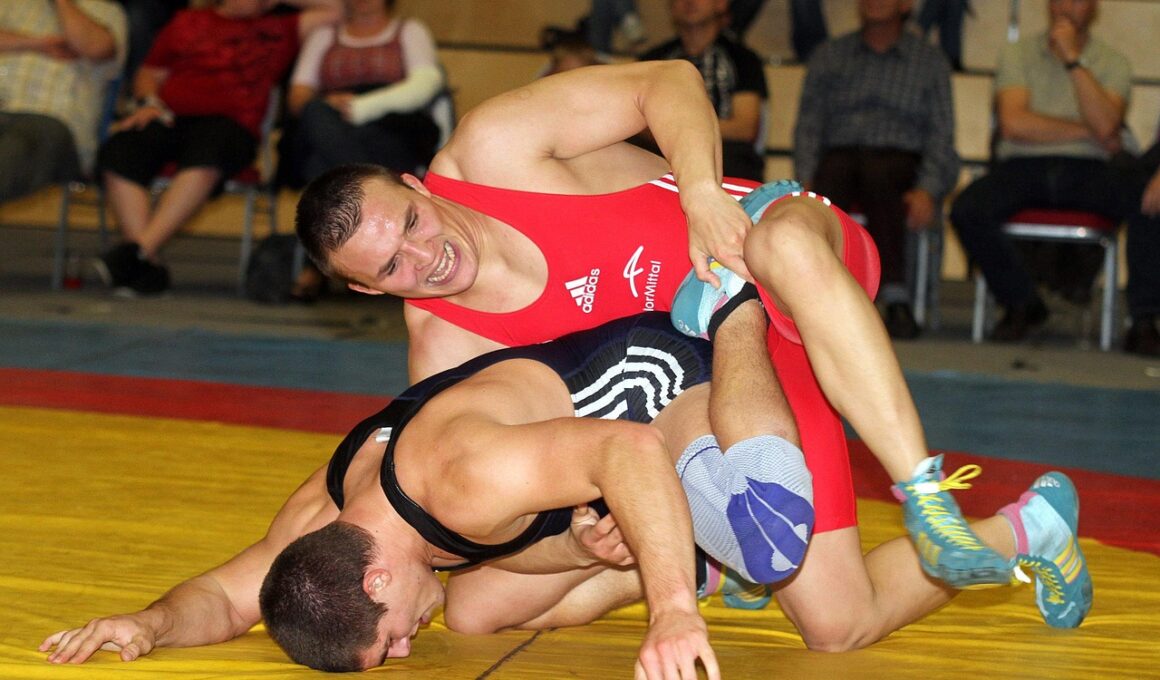The Role of Wrestling in Building Strength and Discipline in Teens
The world of wrestling offers an incredible platform for teens to build not only physical strength but also mental resilience and discipline. As a sport, wrestling requires dedication, persistence, and a willingness to endure challenges both on and off the mat. For many teens, engaging in wrestling cultivates skills that extend far beyond athleticism. It teaches them to set goals, develop strategies, and implement them effectively during matches. The rigorous training routines inspire them to push their limits, enhancing overall fitness, strength, and stamina. Moreover, learning wrestling techniques encourages body awareness and control, essential components for athletic success. The impact of consistent practice can be profound, fostering confidence that translates into other areas of their lives. Many young wrestlers find themselves more equipped to handle academic pressures due to the self-discipline acquired through training. Furthermore, the camaraderie developed within teams provides essential social support, making wrestling a sport that truly nurtures personal growth. Overall, the benefits of wrestling for teens are multifaceted, combining the elements of physical development with irreplaceable life lessons.
The Physical Benefits of Wrestling
Engaging in wrestling as a physical activity brings numerous health advantages for teenagers. This dynamic sport provides a full-body workout, strengthening muscles while enhancing cardiovascular fitness. Techniques learned in wrestling build essential muscle groups, particularly in the core, legs, and upper body. Through the action of grappling, initiating moves, and countering opponents, wrestlers develop agility and flexibility, both critical features for overall athletic performance. The structured training sessions promote endurance, as matches demand significant stamina to maintain aggressive performance levels. Adolescents also see marked improvements in coordination and balance, crucial components for any athletic endeavor. Moreover, wrestling encourages adherence to a structured regimen that promotes healthy habits, including balanced nutrition and regular exercise. These habits contribute directly to the well-being of teenagers, fostering a lifelong appreciation for physical fitness. Coaches often instill the importance of injury prevention techniques, allowing young athletes to engage more safely and effectively in sports. As teens gain strength and improve their fitness levels, they also enhance their self-esteem and body image, leading to positive mental health outcomes. Thus, wrestling serves as much more than a sport; it acts as a catalyst for a healthier lifestyle overall.
Another significant aspect of wrestling is the development of mental toughness among young athletes. Competing in wrestling competitions requires not just physical capability but also a strong mental framework. Wrestlers must maintain focus, discipline, and a competitive spirit even when faced with fatigue or pressure. This mental resilience is built through regular training and competition, as athletes learn to cope with losses and celebrate wins. The ability to analyze each match, learn from mistakes, and improve continuously is a crucial lesson that wrestling provides. Moreover, wrestling teaches constructive handling of emotions—athletes learn to channel their frustrations and exert emotional control during intense matches. Participating in such a demanding environment cultivates perseverance, an invaluable quality for facing life’s obstacles. Teens often draw from this experience in academic pursuits and personal relationships, benefiting from a well-developed mental fortitude. In wrestling, the struggle to outmaneuver an opponent reflects broader life challenges, teaching participants the importance of commitment and hard work. Ultimately, developing this resilience and mental toughness translates into improved performance within and beyond the sport.
Wrestling also offers numerous opportunities for personal growth in essential life skills. Participating in this sport requires a strong commitment to training, which encourages responsibility and time management. Teens involved in wrestling must balance their practices, competitions, and academic schedules, promoting organizational skills. This challenge provides a sense of accountability, preparing them for the intricate life demands that await post-school. In addition, wrestlers learn how to work collaboratively with their coaches and teammates, improving their communication skills. The bonds established in the wrestling room contribute to an atmosphere of teamwork, respect, and mutual support. Interaction with peers in this context fosters camaraderie, enhancing social skills and boosting confidence. Importantly, wrestling emphasizes the significance of sportsmanship; athletes come to understand that winning is not everything. Displaying respect towards opponents and officials is vital, fostering ethical behaviors that will follow them into adult interactions. These lessons create responsible community members who value integrity, respect, and authenticity. Ultimately, wrestling promotes a foundation of character development that is applicable in various aspects of life far beyond the sport itself.
Wrestling and Youth Empowerment
Wrestling can be a powerful tool for promoting youth empowerment, particularly among teens. Engaging in this sport enables young athletes to discover their capabilities, fostering a growth mindset. As they wrestle, teens not only showcase their physical prowess but also demonstrate problem-solving abilities, crucial for overcoming obstacles in competitions. This process allows them to experience firsthand the thrill of achievement, instilling a sense of personal pride and accomplishment that aligns with personal identity formation. Additionally, being part of a wrestling team encourages self-advocacy, as athletes must communicate their needs with coaches and teammates. This engagement highlights the importance of standing up for oneself while ensuring collaborative success on the team. The positive reinforcement from coaches and peers further boosts individual confidence, empowering teens to take risks both in sport and life. Wrestlers often find this empowerment translates into greater assertiveness in academic settings, enhancing their participation in classroom discussions. The discipline and commitment required in wrestling promote resilience, offering essential tools for overcoming adversity throughout their teenage years and into adulthood. Ultimately, wrestling serves as a transformative experience, empowering youth to navigate life with bravery and strength.
The social aspect of wrestling should not be overlooked in its role in building community among teens. During practices and competitions, young athletes form connections with one another, creating friendships that last beyond the mat. This interaction fosters a sense of belonging and inclusivity that is crucial during adolescent years when social dynamics can be challenging. Wresters support one another in both difficult times, such as training injuries, and celebrating victories after competitions. The unity experienced within a team environment develops a familial bond, encouraging emotional connections that enhance overall well-being. Moreover, participation in wrestling invites diverse groups to come together, promoting inclusiveness and respect for differences. Athletes learn to appreciate their teammates’ backgrounds, strengthening the conviction that teamwork transcends stereotypes and barriers. Engaging in a common goal of self-improvement allows wrestlers to share experiences, insights, and life lessons, enriching their lives in numerous ways. This supportive environment nurtures social skills and emotional intelligence while preparing teens for their future roles in society. Ultimately, wrestling presents a unique opportunity for young people to cultivate relationships while fostering a robust sense of community amongst diverse groups.
The Legacy of Wrestling in Character Development
Finally, the legacy of wrestling extends well beyond individual gains, contributing significantly to character development in adolescents. The philosophies imparted through wrestling encourage commitment, perseverance, and respect, shaping the way teens approach challenges in life. Wrestlers learn to embrace both failure and success, which fosters patience and humility—qualities that will guide them throughout their educational and professional journey. The fundamental life skills acquired through wrestling instill strong personal values, enabling a well-rounded character. These values are vital as they transition into responsible adulthood, lessening the likelihood of negative behaviors. The responsibility that comes from being part of a team cultivates leadership qualities that can positively influence their peers. Moreover, these athletes develop a strong work ethic and integrity that will resonate through various settings in life, including academics and careers. As they become role models within their communities, the respect instilled during training experiences will echo in future generations. Ultimately, wrestling provides an unparalleled platform that extends beyond fitness, shaping influential individuals equipped to thrive in life.
In conclusion, wrestling serves as an exceptional vehicle for building strength and discipline in teens, while also embedding essential life skills that last a lifetime. Through this sport, young athletes not only enhance their physical fitness but also nurture their mental and emotional well-being. The lessons learned on the mat regarding resilience, teamwork, and personal accountability are invaluable in shaping well-rounded individuals. As teens engage with their peers in a fittingly rigorous environment, they develop strong social ties and a sense of belonging that is crucial to their growth. With empowerment as a core outcome, wrestling plays a key role in fostering self-esteem and self-awareness, proving beneficial far beyond athletic settings. The holistic benefits offered through wrestling span the realms of physical health, mental fortitude, and character development. This unique and multifaceted sport will, therefore, remain an essential aspect of fitness promotion in youth communities and schools. By valuing the significant impact of wrestling, we contribute to the emergence of resilient, confident, and disciplined individuals ready to face the world. Ultimately, wrestling sends a powerful message about the importance of strength—both physical and moral—in the journey of adolescence.





